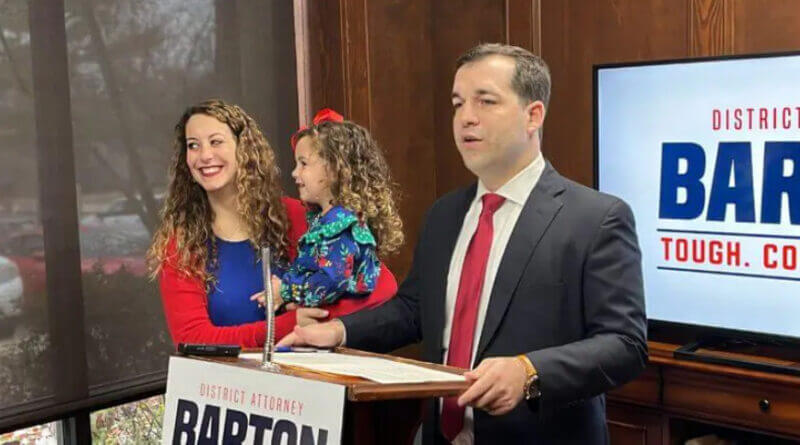Candidate questions residency status of another candidate
Photo: Hernando attorney Matthew Barton announces his candidacy for District Attorney. (Bob Bakken/Mississippi News Group)
This past week, a candidate for office in the August primary election went public to challenge the qualifications of another candidate to be on the ballot.
What becomes surprising at first glance, however, is that the candidate being challenged is not the challenger’s opponent, although the challenger did bring his opponent into question about the same issue at the same time.
Hernando attorney Matthew Barton, a Republican candidate for DeSoto County District Attorney, has sent a letter to the state Republican Party headquarters asking that Mandy Gunasekara be removed from the August Republican primary ballot. Gunasekara is running for the Northern District Public Service Commissioner (PSC) office that current Commissioner Brandon Presley is vacating to run for Governor.
In a news release, Barton said, “Given Mrs. Gunasekera’s disregard for the law and qualification requirements to run for public office, I am filing this complaint – because candidates should follow the rules. Even my own opponent, Bob Morris, is trying to represent voters who are miles away from where he’s filed homestead, voted, and slept at night.”
Residency is what is at question in Gunasekara’s case for Barton to file the complaint. It is also a question Barton has brought up about his opponent, Robert (Bob) Morris III, the current District Attorney appointed by Gov. Tate Reeves after the death of John Champion. Morris is now running against Barton for the office. The District Attorney oversees cases in DeSoto County only now, where before, it was a multi-county jurisdiction when Champion was alive.
Barton pointed out that, according to The 2022 Candidate Qualifying Guide, published by the Mississippi Secretary of State, candidates for PSC must be: “a qualified elector, at least 25 years old, a resident of the Supreme Court district in which he/she seeks election, and a citizen of the state five (5) years preceding the day of election. Miss. Code Ann. §77-1-1; Miss. Const. of 1890, Art. VII, §186, Art. XII, §250.”
A story in the Northeast Mississippi Daily Journal noted that Gunasekara, who worked as Environmental Protection Agency Chief of Staff in the administration of former President Donald Trump, voted in the District of Columbia in 2018, then registered in her Mississippi home town of Decatur in January 2019, and has voted in state elections since. She has resided in Oxford and registered to vote there in 2021.
The story did note that Gunasekara and her husband received a District of Columbia homestead deduction in 2021 and residency is required to receive that. Gunasekara faces the challenge of Tanner Newman of Tupelo and state Rep. Chris Brown (R-Nettleton) in the August vote.
According to the Daily Journal report, Gunasekara said she consulted with Mississippi election law experts before filing paperwork to qualify to make sure all the requirements were met.
Gunasekara did reach out to us concerning her residency questions and offered the following information.
“My heart, my home, and my family have always been in Mississippi,” Gunasekara said. “My time fighting for conservative values with President Trump is why I’m the most qualified candidate and the subject of these attacks. I conferred with Mississippi election law experts and I meet the requirements for PSC.”
Gunasekara’s election lawyer, Spencer Ritchie, added the following comments.
“Under clearly established Mississippi law, citizenship and residency are not synonymous,” Ritchie said. “To the extent Mandy ever lost her Mississippi citizenship during her time working in DC, which is debatable, she certainly regained it once she took several concrete steps in 2018 to abandon DC and once again make Mississippi her permanent home. There is no doubt that since that time Mississippi has been her primary and permanent home. The Mississippi Republican Party State Executive Committee is very familiar with these fundamental concepts in Mississippi election law and we are confident in how they will resolve the matter.”
While filing an official complaint with the state Republican Party about Gunasekara, Barton brought up the question about Morris’ residency in his news release. As assistant district attorney under Champion, Morris and his family lived in Batesville, but they now reside in Hernando.
“In fact, my opponent would not even be eligible to run for reelection in four years based on the law,” claims Barton. “Running for office should be a calling, not a career move.”
Barton stated the District Attorney’s office comes under the five-year residency requirement, as well.
“He (Morris) is still filing his homestead exemption in Batesville,” Barton said. “He only gets to run this time because of a grandfather clause in the statutory language splitting the district which reads, ‘despite residency requirements, the current District Attorney can run again in 2023 if all other qualifications are met.’”
Responding to the question about his residency, Morris said, “I am grandfathered in for this election, but must be a resident for five years in order to qualify for the next term. That is why I moved up here in October. I originally rented an apartment and then we moved up here after we sold our house about a week later.”
Morris went on to write, “Section 25-31-1 states that the District Attorney must reside in the district for five years preceding election day. As I moved here in October, the five year residency requirement is fully satisfied. It is not from the day of the primary, but election day. I was here well before that. However, that does show why we moved up here so quickly.”
We should learn within the week if the state Republican Party will honor Barton’s request or not. We did ask for a comment from Gunasekara through her campaign website but have not received a response.


